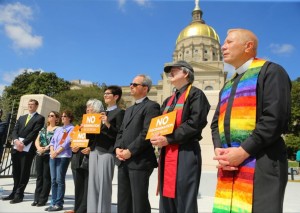A Southern Baptist seminary president says theology played a role in Georgia Gov. Nathan Deal’s decision to veto a measure that would have discriminated against the state’s LGBT community.
Albert Mohler, president of Southern Baptist Theological Seminary in Louisville, Ky., said in a March 29 podcast that along with economic and political pressures, the governor’s veto “is fueled by a theological agenda as well.”
Mohler noted that Deal and his family are members of First Baptist Church of Gainesville, Ga., a congregation identified with the Cooperative Baptist Fellowship, described by Mohler as “a more liberal group than the Southern Baptist Convention.”
Mohler quoted comments by Deal’s pastor, Bill Coates, last summer after the Supreme Court legalized same-sex marriage in all 50 states.

Albert Mohler
“Each church will have to decide how to walk through the marriage equality debate,” Coates said at the time. “I think we should respect those who choose to allow their ministers not to perform same-sex weddings out of their own deep convictions, and I think we should respect churches that choose to allow their ministers that right, for they make their choice out of deep convictions, too.”
Coates went on to say: “As with most things in life, we have to balance. In this case, we must balance our esteem for the dignity of every person, gay or straight, with the harmony of the congregation we are part of. It is not easy, but it is possible. Jesus teaches us to love God and love our neighbor, just as Moses taught. We cannot love our neighbor and treat him or her as a second-class citizen at the same time. I say this: I do not always know what the truth is, but I can always tell what love is. I believe love is the greatest of all, and to do the loving thing will always be the right thing. Most congregations will eventually find their way there.”
“What that can only mean is that most congregations will eventually get to an affirmation of same-sex marriage in one way or another,” Mohler said.

Faith leaders speak out against anti-LGBT legislation at the Georgia Capitol. (Photo/Promise the Children)
“It is all of a piece,” Mohler said. “When eventually the history of this moral revolution is written, it will be very clear that various forces were at work and in concert. They include political pressure, economic pressure. They include activism by LGBT groups. They include those who eventually reach the tipping point in a society where they decide — you’ve heard this argument so many times before — they are determined to end up on the so-called right side of history.”
“There will be theological and religious actors as well,” Mohler said, “and we shouldn’t be surprised to find them using extremely similar language: language that in the end means that sooner or later everybody has to join the moral revolution. It is only at the end of the day for those who are forcing this revolution a matter of when, not if.”
In a statement to BNG, CBF executive coordinator Suzii Paynter said Deal’s veto “does not diminish religious freedom for congregations.
“In uncertain times, we seek certainty through government, but religious liberty has taught us that there’s peril in seeking confidence from the state,” Paynter said.
“The rich variety of expression within the church of Jesus Christ has contributed to the vitality of Christianity across the centuries and cultures worldwide. The Good News of God’s message in Christ has weathered many cultural storms and disagreements. It is the strength of the Lordship of Christ which prevails in all times. Jesus calls us to unity in Christ amidst real diversity, so ‘that the world may know.’”
Deal said he decided to veto HB 757, a bill exempting religious officials from marrying couples of the same sex, because by the time it reached his desk it “contained language that could give rise to state-sanctioned discrimination.”
“As I’ve said before, I do not think we have to discriminate against anyone to protect the faith-based community in Georgia of which my family and I are a part of for all of our lives,” the Republican governor said. “Our actions on HB 757 are not just about protecting the faith-based community or providing a business-friendly climate for job growth in Georgia. This is about the character of our state and the character of its people. Georgia is a welcoming state filled with warm, friendly and loving people. Our cities and countryside are populated with people who worship God in a myriad of ways and in very diverse settings. Our people work side-by-side without regard to the color of our skin, or the religion we adhere to. We are working to make life better for our families and our communities. That is the character of Georgia. I intend to do my part to keep it that way.”
A CBF statement distributed to BNG by a spokesperson echoed Paynter’s emphasis on unity.
“Unity within the larger family of faith has been the foundation of the Cooperative Baptist Fellowship for 25 years,” the statement read. “As a Fellowship we seek to live into God’s gift of unity while celebrating our liberty in Christ. In the face of controversies in the public square, such as Georgia Governor Nathan Deal’s recent veto of HB 757, we should reflect on the importance of these gifts of unity and freedom.
“As Cooperative Baptists, we understand advocacy to be a biblical, faithful expression of Christian mission. Being an advocate means responsibly speaking out on behalf of others. We lament the lack of civility from otherwise well-intentioned voices who have questioned the faith and convictions of Governor Deal and targeted other opponents of HB 757 with divisive and derogatory rhetoric. As Christians, we can do better. Christ compels us to do so.”
For the second year in a row officials of the 1.3-million-member Georgia Baptist Convention, a statewide affiliate of the SBC, came out early in support of the legislation prompted by the Supreme Court decision legalizing same-sex marriage.
Previous stories:
